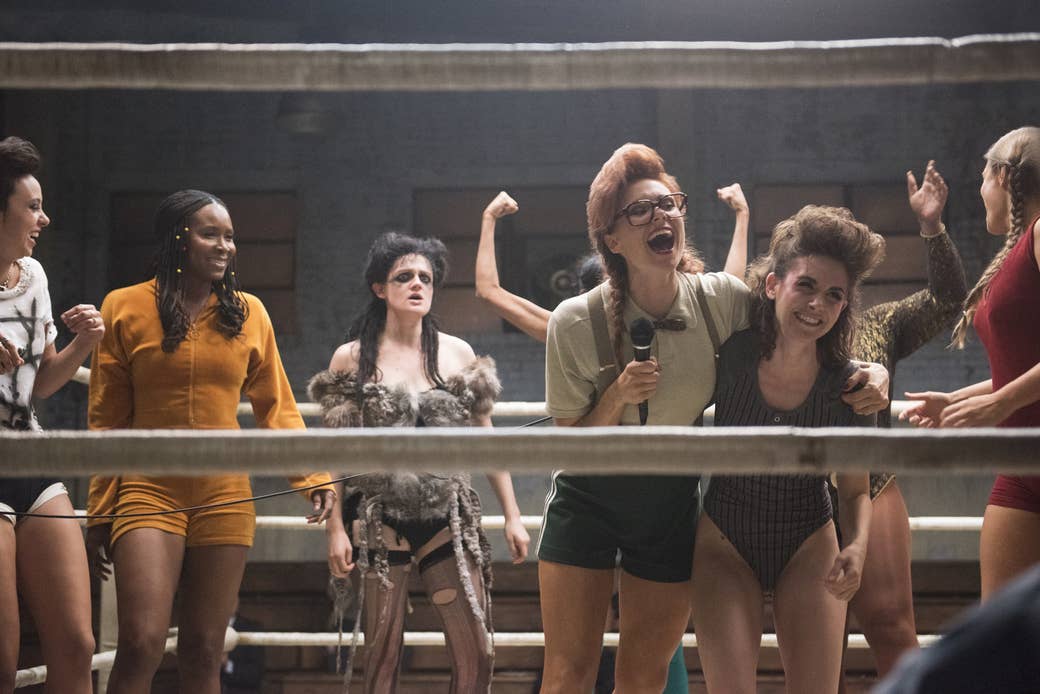
Netflix’s wrestling drama GLOW is funny, poignant, and wonderfully acted, but what makes it really interesting is how aware it is of its own contradictions. The series’ fictionalized take on the real Gorgeous Ladies of Wrestling promotion from the ’80s explores how empowerment and exploitation aren’t always so clear cut or easily parsed. Its female characters are women who’ve been dismissed by Hollywood as the wrong size, race, type, or tractability level. In joining GLOW, they’re promised exposure and rich material from which to work, but only by way of what the program's director Sam Sylvia (Marc Maron) cheerily refers to as “porn you can watch with your kids, finally.” And while these women are assured that the outsize wrestling personas they create are a way of challenging stereotypes of gender, race, and class, they have legitimate reasons for wondering if anyone watching will know that.
With a first season running 10 half-hour episodes, GLOW is the rare Netflix show that feels too short, given its abundance of promising characters and how relatively little runtime it has to spread among them. It’s a series that pits its characters against each other in staged catfights, but sometimes feels like it inadvertently pits members of its own talented cast against each other in a battle for screen time. And so, in the spirit of GLOW’s multilayered dramas, here’s a ranked look at how each of the Gorgeous Ladies of Wrestling fared for themselves over that rousing first season.
14. Reggie "Vicky the Viking" Walsh
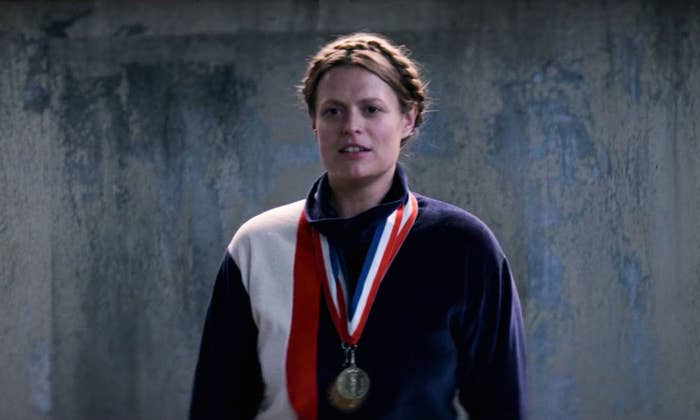
Reggie is the only actual professional athlete in the main ensemble, so of course she gets the shaft, both in the series itself and the show-within-the-show. Physical prowess isn’t remotely the highest priority for the kind of production Sam and producer Bash (Chris Lowell) have in mind. Early on, the plum role of Liberty Bell is taken away from Reggie and given to the more conventionally attractive Debbie (Betty Gilpin) — “She seemed more all-American,” the men shrug. And that’s basically everything of note for the character, who keeps to the background, but at least gets a fabulous Viking hat for her troubles.
13. Jenny "Fortune Cookie" Chey
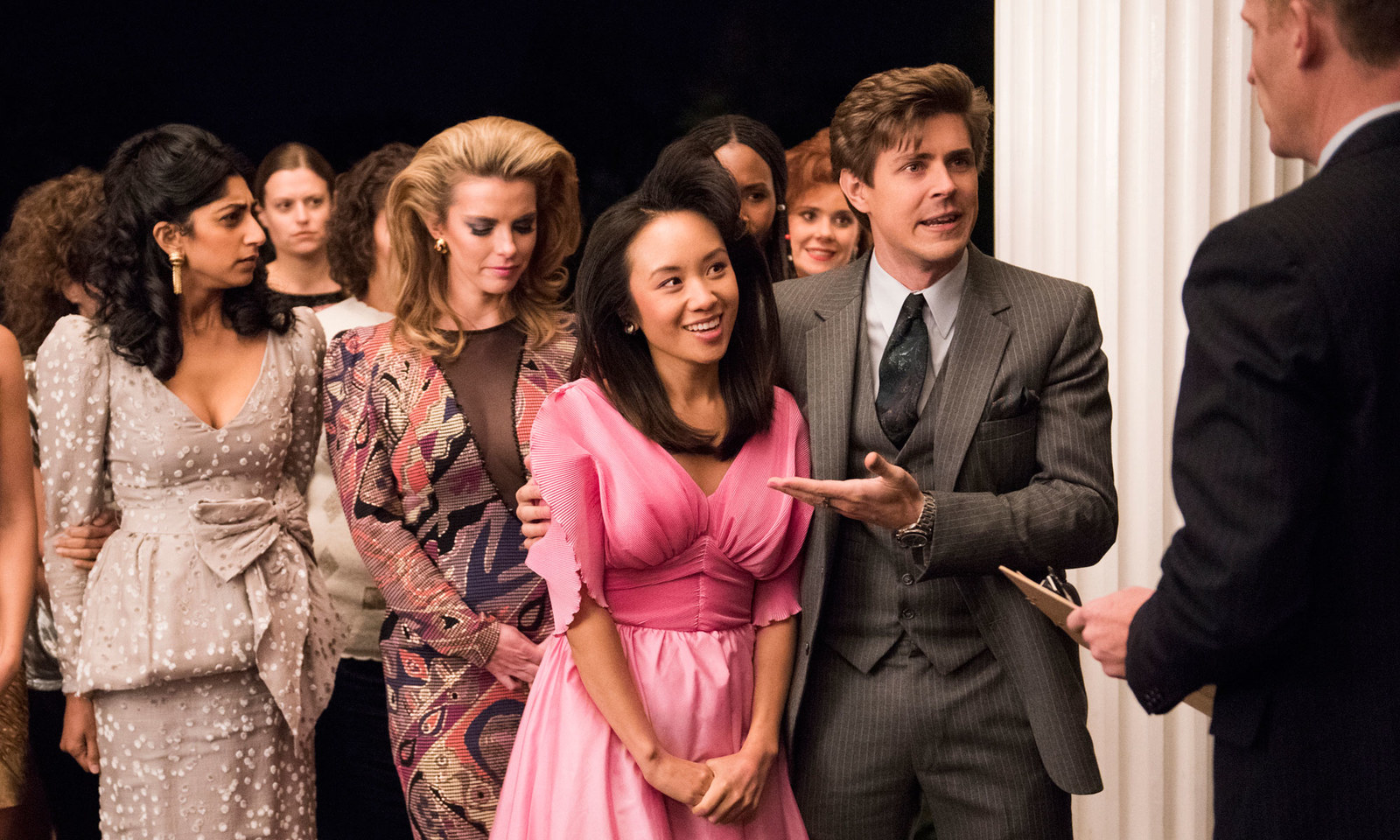
In a monologue combining a dozen Orientalist stereotypes into one hilariously tasteless package, Jenny doesn’t just lay forth her own wrestling persona: She establishes a pattern into which all of the other characters will soon settle. Wearing a conical hat and wielding a samurai sword, Fortune Cookie declares herself “cute like panda” but also “fast like dragon!” Jenny herself is Cambodian, adores birthdays, and...that's about it. Wong is so funny during her Fortune Cookie intro that it’s a shame she doesn’t get more time in the ring — though she does at least get to team up with Alison Brie’s Russian wrestling character in the final episode of the season, for a clever Communist allies combo.
12. Justine "Scab" Biagi
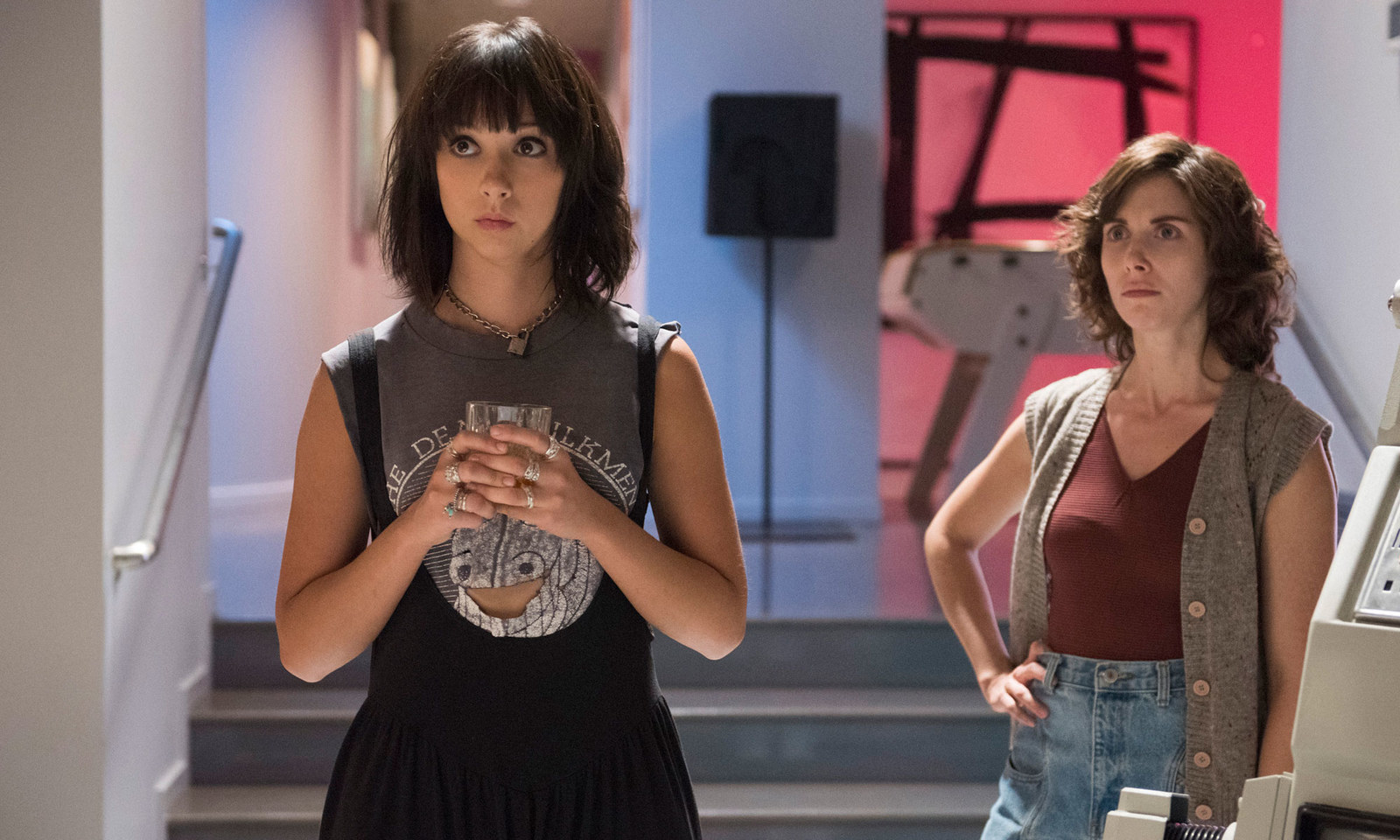
As GLOW’s punk wrestler, resident teen Justine doesn’t really click during the first part of the season. She’s sulky and sullen, a devoted fan of Sam’s schlocky movies and of movies in general, and has a stilted thing for the pizza delivery guy. But then there’s that reveal, which unfolds in the most excruciating way imaginable: Justine is Sam’s daughter. In truly Freudian fashion, aligning perfectly with the psychosexual themes of Sam’s films, the truth comes out after Sam makes a move on the horrified young woman, prompting her to confess she’s the result of a one-night stand Sam had after he was kicked out of a Black Panther rally. He handles it (predictably) poorly, but Justine finally snaps into focus — not some kid idolizing a failed artist, but a girl trying to figure out how to connect to her father.
11. Arthie "Beirut the Mad Bomber" Premkumar
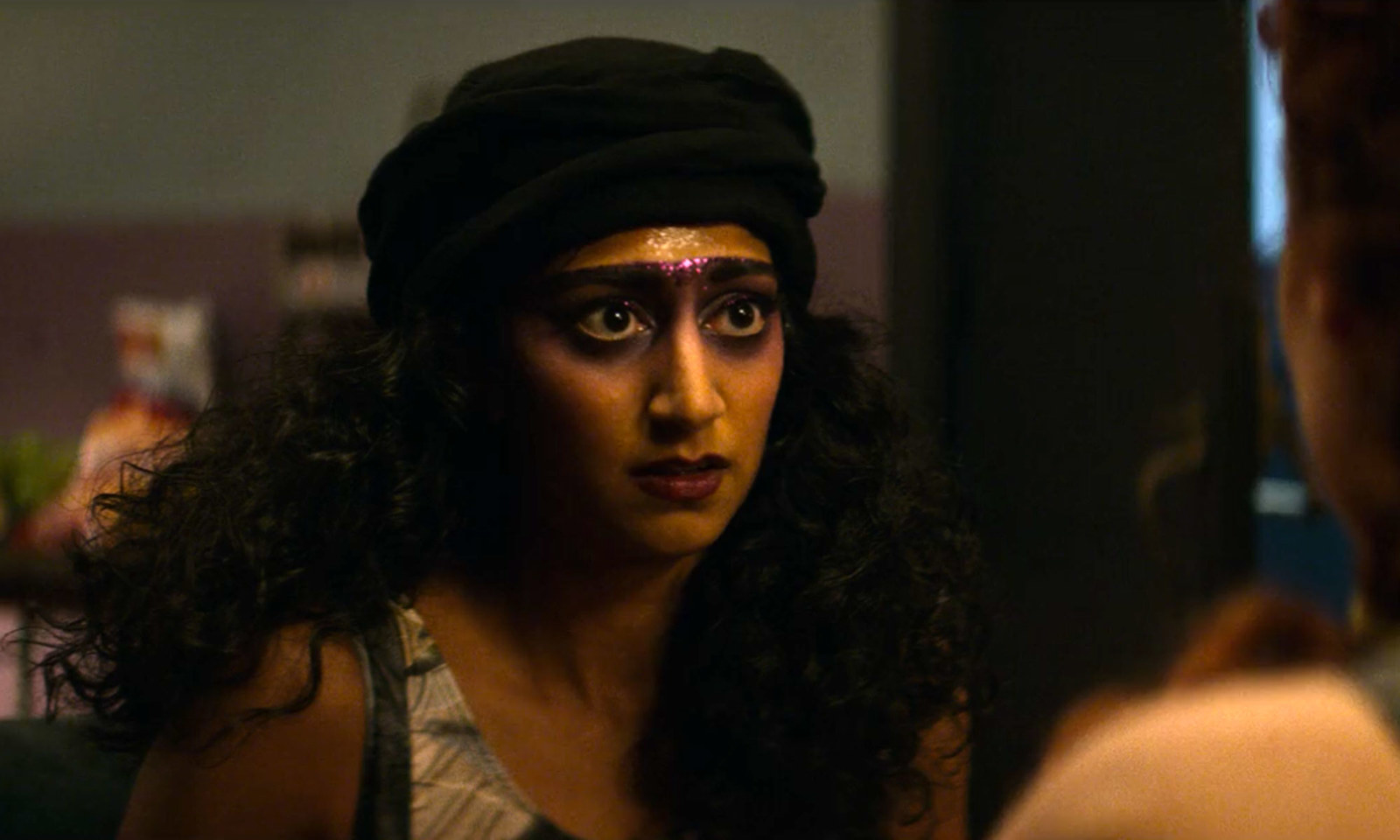
Nowhere is GLOW’s shortness more frustrating than in the cases of Jenny and Arthie Premkumar. The show’s cast is laudably diverse, but while the biggest stories go to the two white leads, these two characters of color are left without real arcs. Arthie, a premed student, is Indian-American, but per GLOW’s blithe racial insensitivity is told to present herself a “terrorist or genie or some sort of other evil Arab.” And so she dons a keffiyeh and becomes Beirut the Mad Bomber, the most incendiary of the wrestling personas. Mani (who showed off her dancing skills in the “Turn Down for What” music video) goes for broke, running around the ring wild-eyed and working up a signature move — the Lebanese Cannonball. But the payoff, in which Arthie facing real ire from a live audience who yells racial slurs and hurls beer cans, ultimately comes off as an unfinished thought. “Everyone really hated me,” she tells Rhonda (Kate Nash) afterward. “Yeah, but that's a good thing, though… right?” Rhonda answers. Arthie doesn't answer.
10 & 9. Stacey "Ethel Rosenblatt" Beswick and Dawn "Edna Rosenblatt" Rivecca
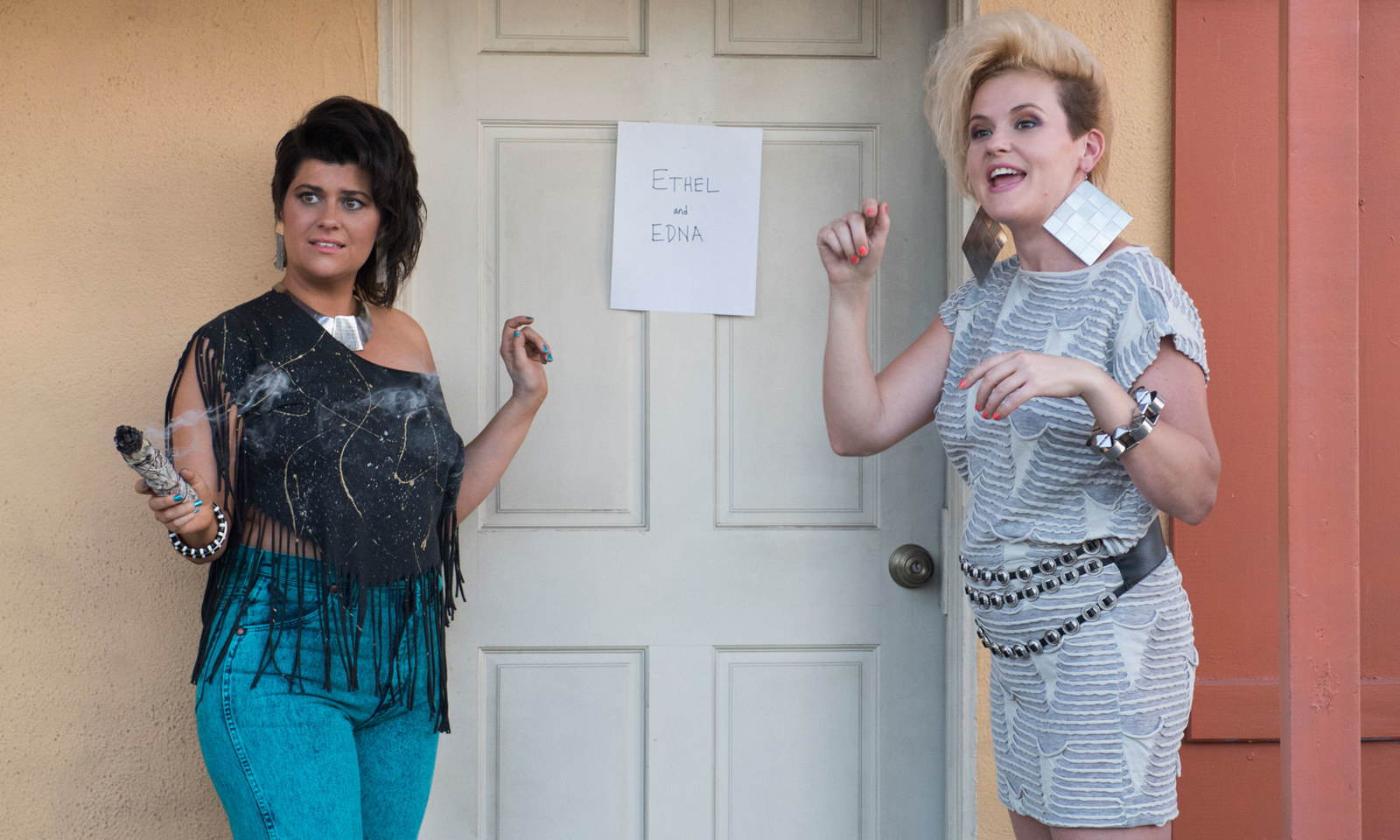
“Our clients think we're funny and should be on television,” hairstylists Stacey and Dawn tell Sam at their audition. Turns out, their clients are right. Stacey and Dawn don’t get an arc either, but they, at least, don’t feel like they require one. As the series’ reliable source of comic relief, they are the Statler and Waldorf of ladies' wrestling, cackling and making prank calls from the sidelines. Gatewood and Johnson, two-thirds of the talent team behind The Apple Sisters, enjoy hamming things up as much as Stacey and Dawn do. They may not be the most fearsome of wrestling talents when they go into character as the elderly wrestlers Ethel and Edna Rosenblatt, but they’re so much fun to watch.
8. Sheila "The She Wolf"
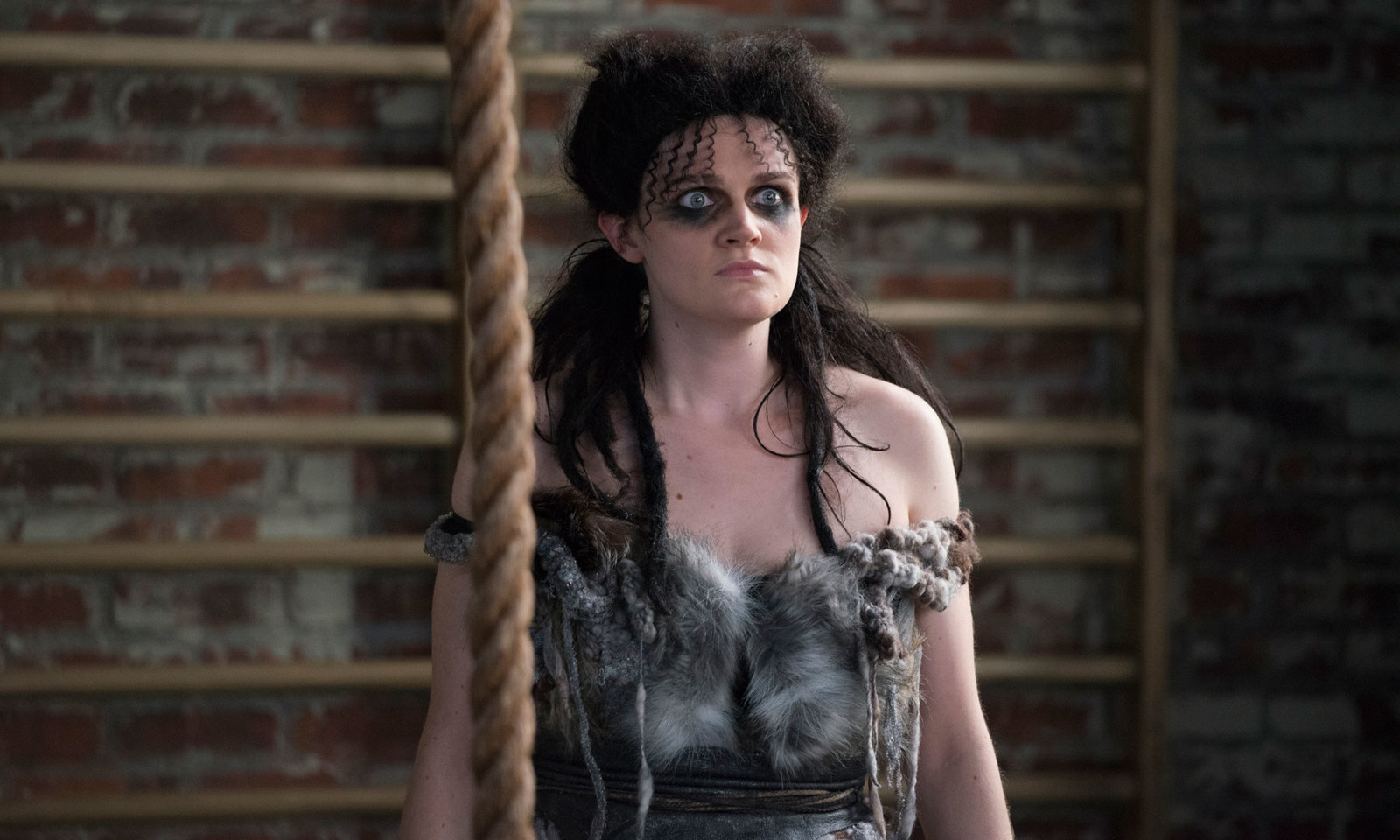
Sheila’s got one note, but it’s, er, a howler. While all of the other women have to work up to their outsize personas, she lives as hers, 24/7. The fourth episode provides the only instance in which we see Sheila not fully done up, and it reveals her morning ritual — smearing kohl around the eyes, staining her teeth yellow, putting on a matted wig, and exhaling a sigh of relief, everything finally being as it should. She also wears a fur bodice, doesn’t talk a lot, and genuinely feels like a wolf in a human body. Sheila works better as a source of pathos than of quirk, a way for the show to delve into the idea that feeling like a genuine outsider doesn’t mean you’re guaranteed to be great at playing one on TV. Maybe that's why she pairs so well with Brie’s character, Ruth, an actor who keeps treating Sheila’s behavior as some kind of method stunt instead of a form of dysmorphia. It forces Sheila to try to articulate why it wounds her when everyone treats her wolf affiliation like an eccentricity instead of part of her identity.
7. Rhonda "Britannica" Richardson
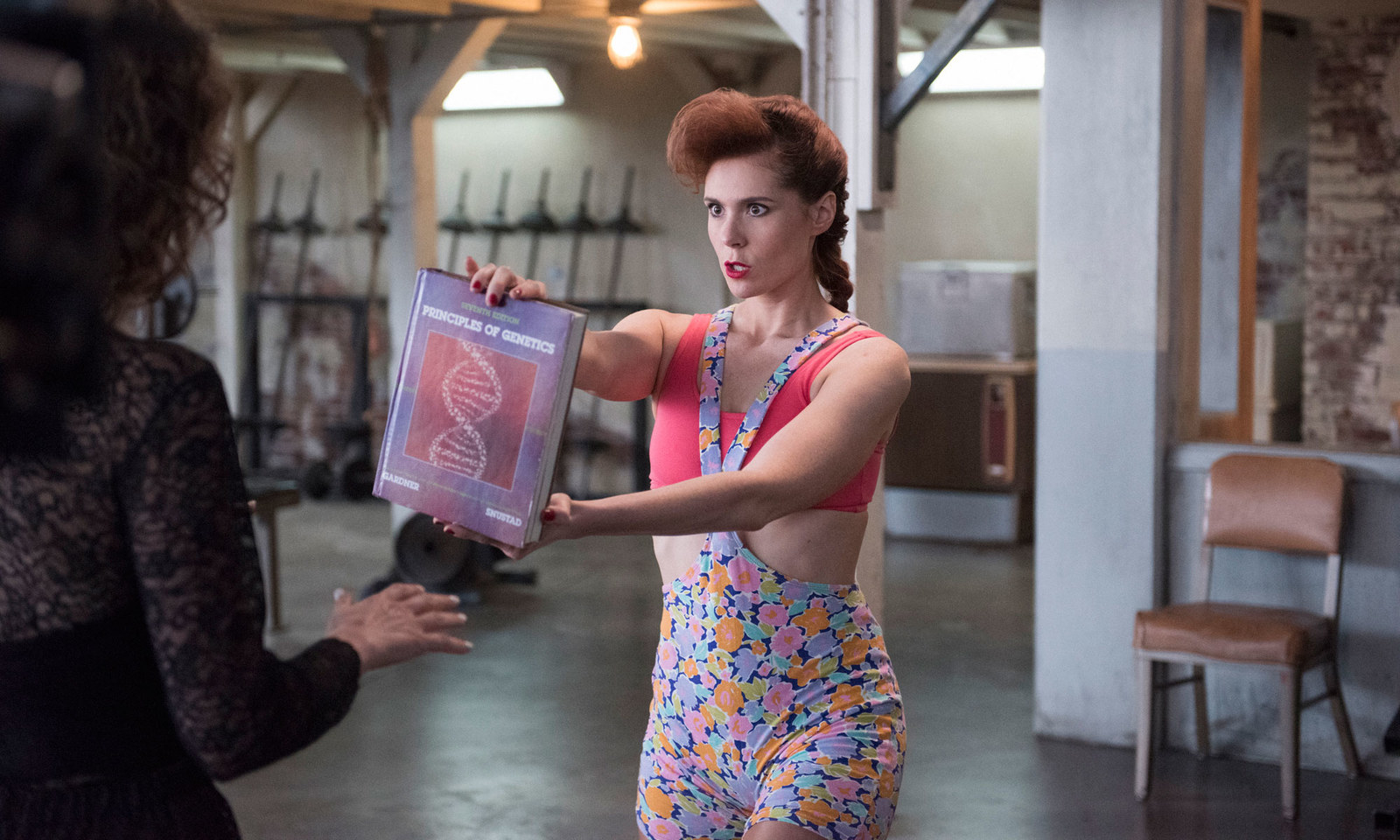
Rhonda is a dim bulb in real life who, in the ring, plays Britannica, the smartest woman in the world. It’s not the most revelatory of divides between fact and fiction, but Rhonda makes up for it with juicier backstage antics, including her affair with Sam. Rhonda has blundered through life being pretty, moisturizing carefully, and not thinking too hard about what’s next. But she has an emotional intelligence that others underestimate — among them Sam, who assumes Rhonda’s sleeping with him to get special treatment, only to figure out too late that she actually liked him. It’s Rhonda who comes up with the GLOW theme song, and Nash (who’s a singer) mimics ’80s-era white-rapping flawlessly, delivering an awful, slightly off-rhythm earworm that’s impossible to shake: “GLOW, GLOW, that's the name / Women's wrestling is our game.”
6. Melanie "Melrose" Rosen
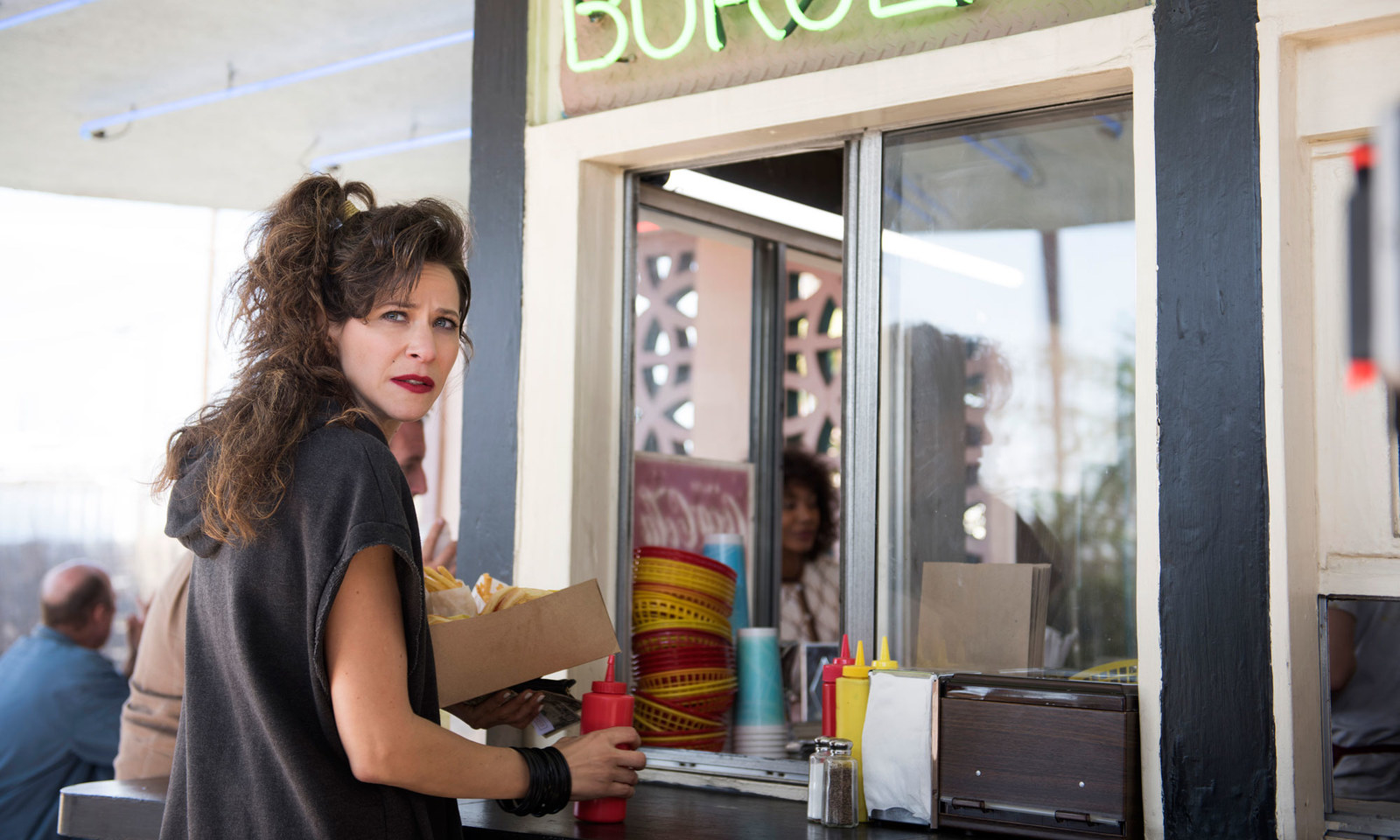
Melanie may be the only character on GLOW whose actual personality manages to dwarf that of her wrestling persona. Party girl Melrose, a transparent Madonna knockoff, is but a pale imitation of the force of nature that is Melanie. Melanie is the kind of woman who drives a limo, has what Sam calls a “‘please objectify me’ vibe,” and claims as her special talent that she “can wake up in the morning with absolutely nothing to do and just be in a Van Halen video by the end of the day.” Melanie strives tragically hard to be interesting, but the thing is, it works — the show is able to bounce her off of other characters to reveal different nuances and to create new drama. It’s Melanie who initiates the astonishingly insensitive prank of pretending, with the help of some purloined ketchup, to have a miscarriage due to a stunt gone wrong, an act of multilayered revenge against Cherry (Sydelle Noel). It’s also Melanie who needs to star in the R-rated sitcom spinoff GLOW leaves you longing for, one in which she'd solve crimes in the company of Bash’s drug-laden robot butler.
5. Cherry "Junkchain" Bang
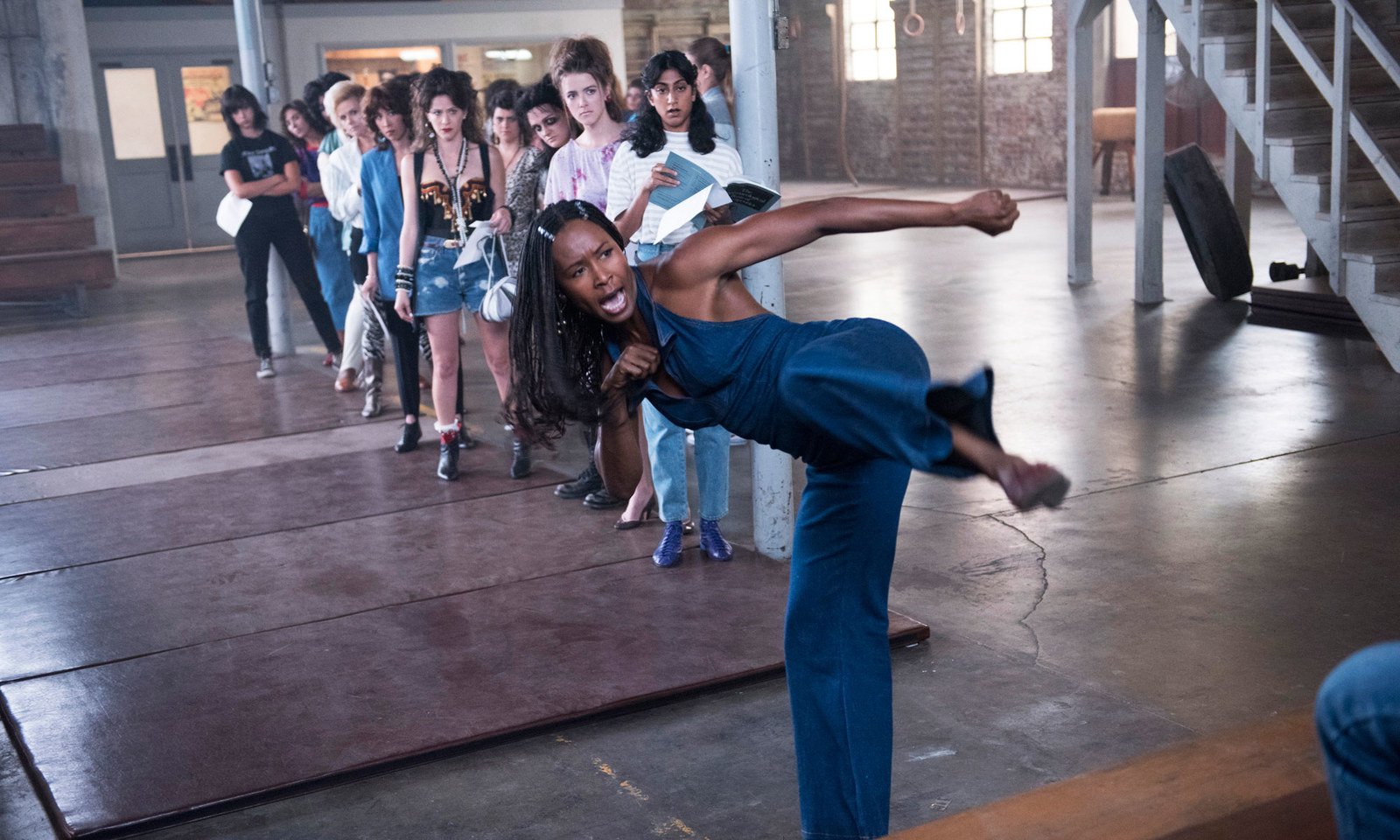
Cherry is GLOW’s most competent member, which is less praise than it is a misfortune for her. A stuntwoman who stopped getting work because, as she tells Sam, “movies get a little white after 1979,” Cherry actually knows what she’s doing in terms of falls and jumps. Which is why she gets railroaded into training the other wrestlers, having to play hall monitor and hardass while getting shorted when it comes to her on-camera persona. Cherry is the grown-up of the series, but she’s no less captivating for it, and Noel plays her as steady but guarded, harboring various emotional wounds from a frustrating career and from having lost a child. It’s through her eyes that we see GLOW as the ramshackle operation it actually is, held together with grand promises and cocaine delusions. And it’s Cherry, joining up with Tammé (Kia Stevens), who provides GLOW’s most triumphant instance of the wrestlers taking control of their narrative by engineering a too-provocative-for-TV match against opponents dressed as members of the KKK.
4. Ruth "Zoya the Destroya" Wilder
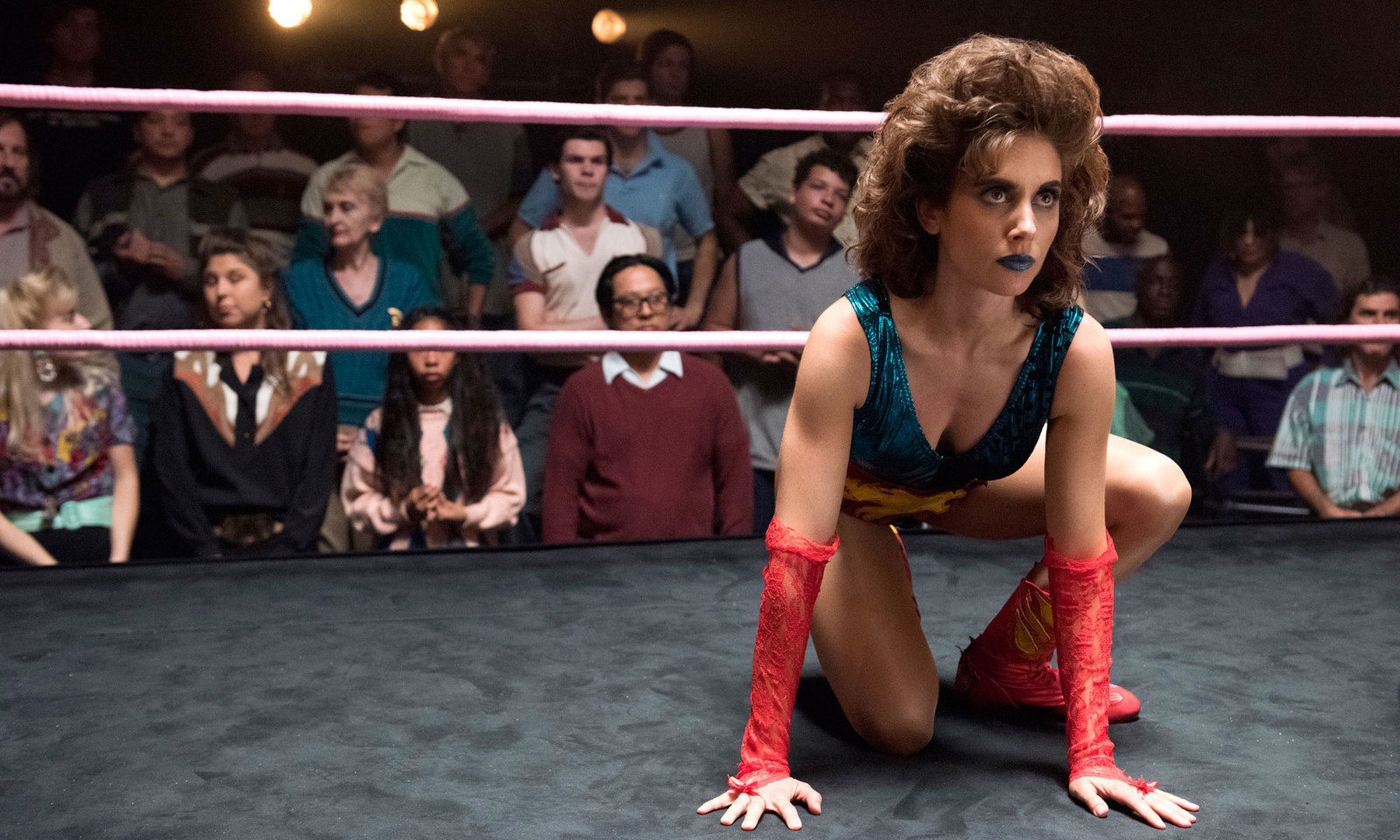
It’s a credit to Brie’s skill that Ruth, the closest GLOW comes to having a main character, can be so annoying. She’s a theater kid who craves the spotlight in which no one is willing to allow her. Her qualifications include “extensive mask work and clowning workshops” and a willingness to show up to auditions where casting directors use her as a tool to get other, more commercially viable actors picked. She’s not lovable, Ruth, who starts the series by sleeping with her best friend Debbie’s (Gilpin) husband because she's feeling bad about herself. Brie plays up Ruth's self-pity and her neediness in ways that flesh out the character, making her empathetic without being endearing. “I don’t want everyone to hate me!” she wails to Sam; he answers, brutally, “Crying, caring, the desperation. That's what makes you unbearable.” He’s not wrong, but it turns out we don’t need to like Ruth to invest in her journey toward self-acceptance. Ruth isn’t meant for saving the day, no matter what she thinks of herself. She’s the heel, and once she finds her rhythm as Russian tyrant Zoya the Destroya, she lights up — though (again, credit to Brie) once she settles into her Soviet shtick, she almost immediately starts running it into the ground.
3. Tammé "The Welfare Queen" Dawson
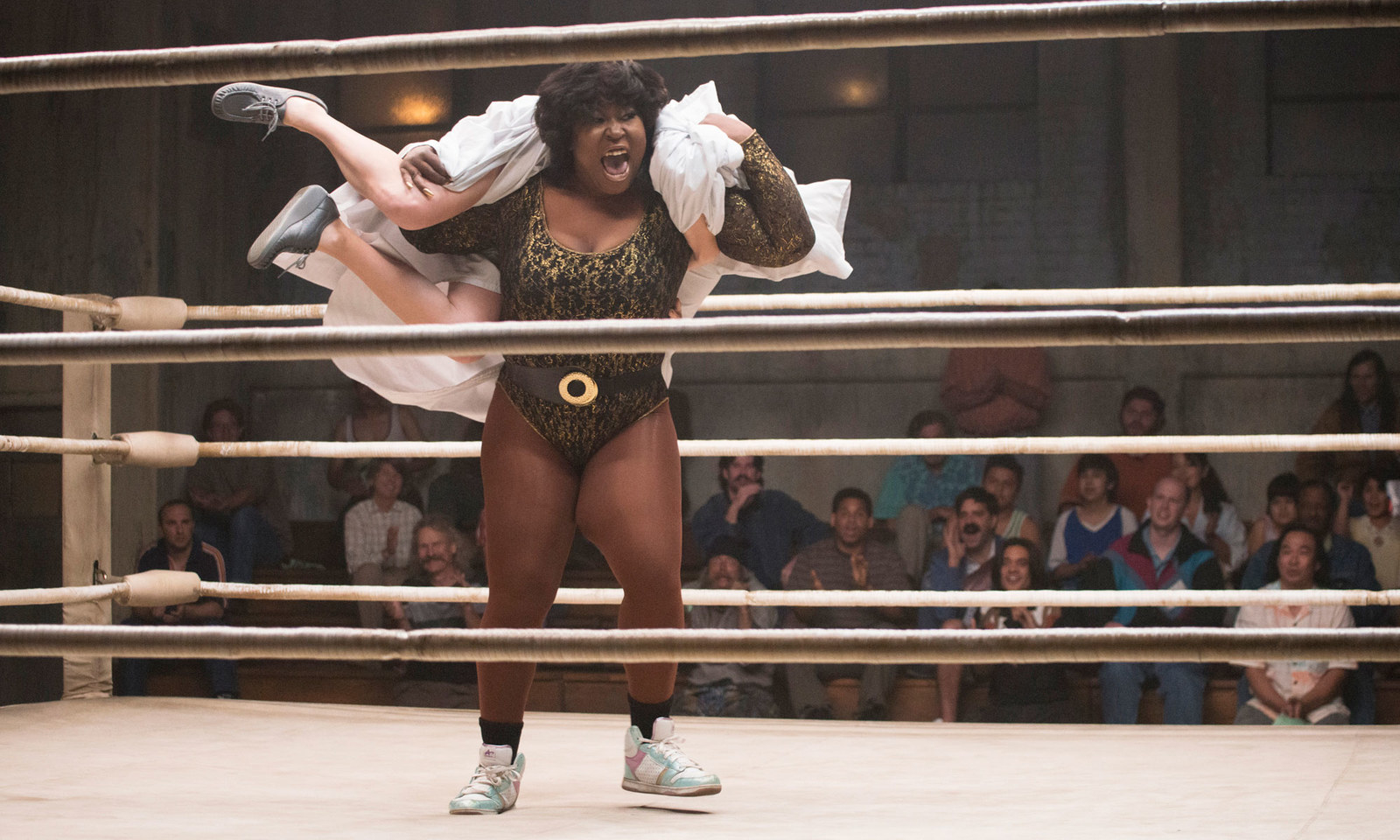
Tammé has a kid at Stanford, but when she heads into the ring, she’s a boogeywoman right out of Reaganite rhetoric, a semi-mythical figure used to rile the public about scammers getting rich off taxpayer money. Tammé plays the Welfare Queen, clad in a fur coat and jewelry, smirking that “Y'all are stupid for going to work every day and paying taxes.” As a living embodiment of conservative fears, the Welfare Queen is right on the line between offensive cartoon and subversive satire, and when Tammé raises her concerns with Sam, the conversation is fascinating. Sam goes on about pushing the envelope and creating “a fuck-you to the Republican party,” but Tammé, a bit player for whom GLOW is a huge break, is the one who has to stand in front of the camera, and the one wondering if she’s being taken advantage of. And yet of all the GLOW women, she's the one who has the best feel for her persona, no matter whom the Welfare Queen has been placed into combat with. It certainly doesn't hurt that Stevens is a real-life pro wrestler with a 15-year career under her belt. When Sam and Bash declare the Welfare Queen “our masterpiece,” their self-congratulatory sense of ownership is questionable, but they’re not wrong — in the ring, Tammé is a thrill.
2. Debbie "Liberty Belle" Eagan
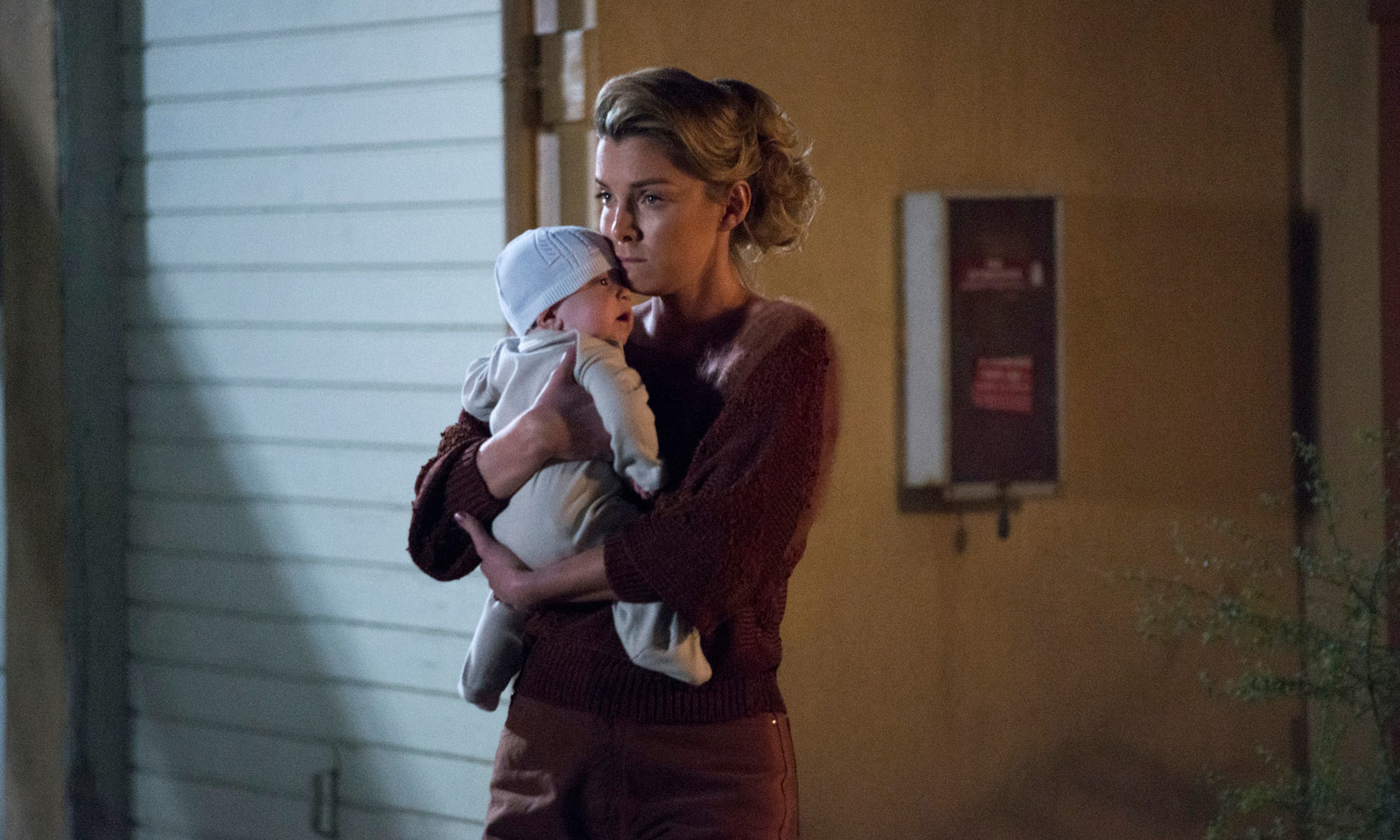
From afar Debbie, a soap opera star turned stay-at-home mom, doesn't seem like she'd be interesting. Her character — the all-American hero, Liberty Belle — doesn't seem like she would be all that interesting either, just a blandly beautiful face who’s supposed to win her matches and reassure the world that order continues to hold. And yet, courtesy of the show’s writing and of Gilpin’s performance, both Debbie and her persona are totally compelling. Debbie is the friend who appears to have it all together. She’s the one who got cast on the soap opera, the one who married well (at least on paper), the one who had a baby. But Gilpin broadcasts her character’s barely disguised dissatisfaction through her every pore, even as she insists she’s happy. Debbie is all sharp edges underneath the curvy, blonde exterior, brittle and angry and hungry to have something of her own, and her friendship with Ruth is GLOW’s broken but still-beating heart. The moment she stands up in the crowd during the final match, announcing she’ll take her place in the ring, is the highlight of the series, both in terms of the shlock wrestling narrative and the backstage one. And of course, even then, the match doesn’t go precisely as planned. Why should it, really? Maybe it’s order that’s boring.
1. Carmen "Machu Picchu" Wade
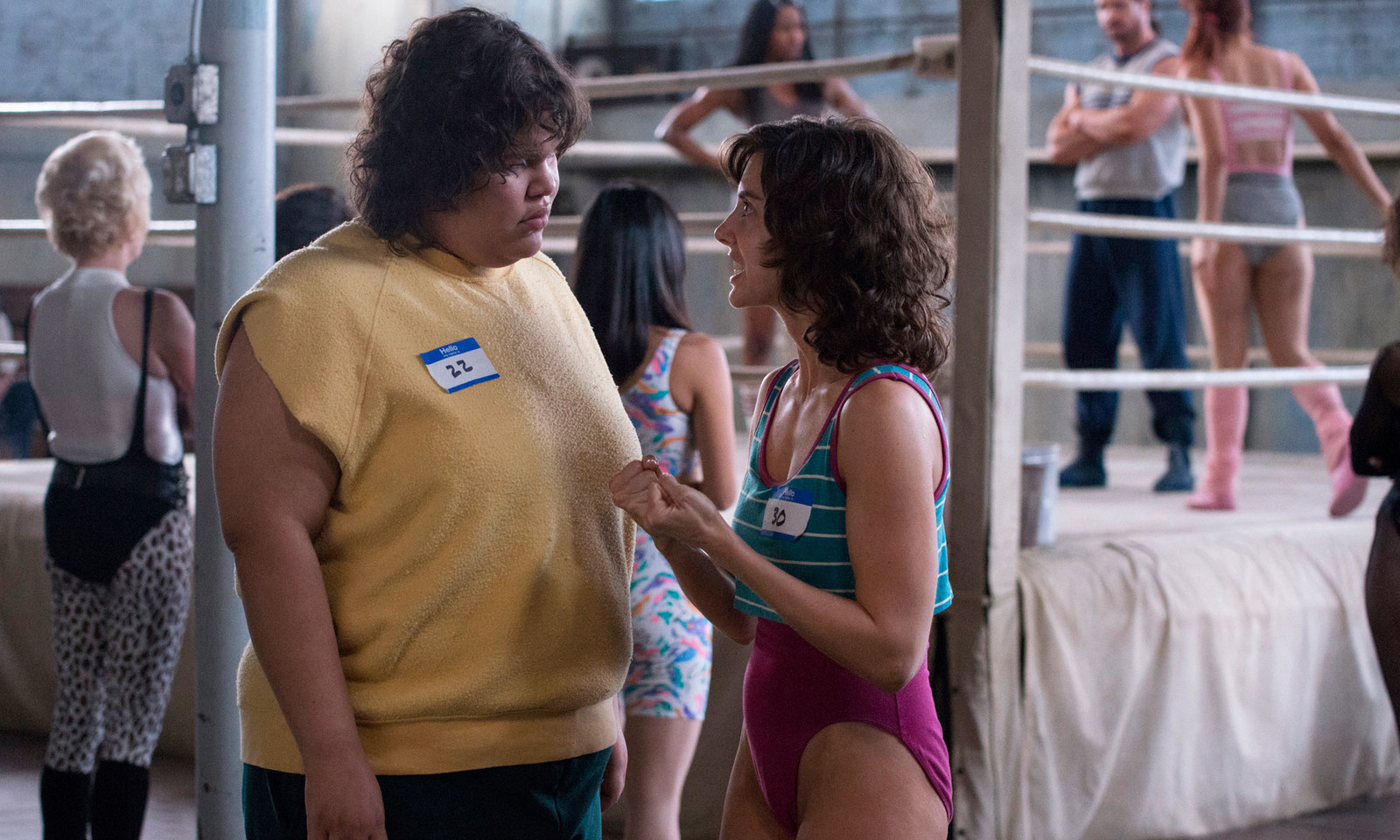
OK, sure, when Carmen’s estranged father, a famous wrestler named Goliath Jackson (Winston James Francis), shows up at the end to support his daughter, it’s a little pat. But if there is a stealth MVP of GLOW who embodies everything the series does best in its first season, it’s Carmen Wade, a naive, awkward, towering young woman with anxiety issues and a parent who doesn’t want her joining the family business. Carmen handily demonstrates wrestling basics for what is essentially a group of know-nothings, but there’s something particularly touching about the ways in which she tends to place herself on the outside, even in a world she knows better than anyone else onscreen. Carmen assumes she’s a heel, a villain who scares kids. But Bash (with whom she develops a winsome, surprising connection) insists she’s been a hero all along: “Look at this face, huh? Look at that smile. You're smiling all the time.” She is always smiling, even when she introduces her wrestling persona: “Machu Picchu, the Peruvian fortress, strong and proud.” “I’m a good guy,” she giggles with delight, and it’s impossible not to join her.
